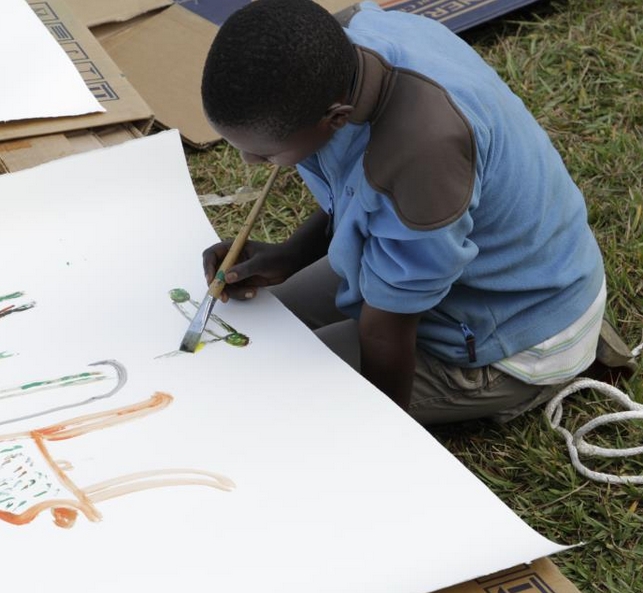
Survivors Fund (SURF) has facilitated a number of research projects in recent months. In each case, we have worked with the researcher to help frame their research question so that the result is of practical value to us, as well as of academic interest too.
In a series of blog posts over the coming months, we will post relevant excerpts here on the SURF Website. This first post is of research conducted by Stuart Jones on the situation of children born as a consequence of rape, from his research report, Like a Tree without Branches.
Children born as a consequence of rape in armed conflict receive scant attention in post conflict environments. Acknowledgement of their social conditions factor little in shaping state policies for protecting the rights of the child. Following accounts of sexual atrocities and forced pregnancies in the Former Yugoslavia and Rwanda during the 1990’s, there has been selective acknowledgement of these children as a vulnerable group. However interest remains largely at academic level and children of rape in conflict continue to fall below state recognition.
For the most part previous research has taken a broad approach in conceptualising war rape and children born thereof. Although many similarities in patriarchal attitudes and community dynamics are applicable across different societies, it remains that cultural, economic and political specifics of individual states will shape the unique circumstances of these children. Furthermore there exist many variations of conflict for which rape factors highly and all may have differing impacts on the child’s identity. With this in mind the following research adopts a case study of Rwanda and specifically addresses rape as form of genocide.
It is 19 years since the Rwandan genocide devastated the nation. This time frame is significant as the children of genocide rape are only now becoming adults and are thus able to illustrate the full experience of their childhood. It also provides insight into how stigmatism may continue to affect their lives as adults. Children of genocide rape represent bad memories for the victimised group and little attention is given to the significant risks children and mothers face in post conflict communities. Children can experience difficulties in locating social security in hostile communities, and may be ostracised from both public and private environments. They may also face abuse and trauma from care providers struggling with difficult circumstances and the conflicting identities of the child. This can violate fundamental rights of participation and membership and can be damaging to a child’s capacity for development.
The main findings of the research established a number of issues affecting children of genocide rape, these include;
- Spoiled identity; both in community and home environments children are stigmatised and negatively associated with the perpetrator group.
- Trauma; relating to the mothers experience and any resultant emotional unavailability to the child. Additionally secondary trauma; in the child attempting to manage her/his social and emotional environments.
- Disclosure; The levels in which children have control over and manage their identity. The importance of disclosure for healing.
- Non-recognition; official failure to factor into policies the specific dynamics affecting the child’s ability to lead a full life.
- Women’s Autonomy; interconnection with the subsumed position of women in Rwandan patriarchal society; logic of sexual violence and attack on capabilities of both mother and child.
In the first part of the research, societal attitudes towards women, rape and community are established in relation to spoiled identity of mother and child. The foundation of which forms the habitat in which negative effects on the child can become buried and forgotten. Understanding the broad difficulties Rwanda faces in terms of wide spread poverty and multiple vulnerable groups is addressed. It is argued however that throughout the lives of children born from genocide there exist specific circumstances which make them doubly vulnerable to the varied difficulties affecting others.
Importantly it is argued that by avoiding the topic of children resulting from rape in genocide, Rwanda has failed to explore and heal avenues of cultural antagonism which can be markers of future division. Children of genocide rape are considered a uniquely vulnerable group with failed claims to collective membership, offering a poignant insight into how communities structure identity.
Rwandan children of genocide rape may be entering adulthood; however the opportunity to learn from their experiences is immense. Polices of sexual violence and group destruction are occurring today. In war torn Darfur, female civilians, young and old are being subjected to large scale sexual attacks [HRW, 2008: 11]. Mass sexual violence by the Congolese Army in the DRC is common and wide spread practice [HRW, 2009: 92]. Sexual assault and rape has become a growing problem in present day Syria, with security forces assaulting women and girls in detention and in the home [HRW, 2012]. Children of rape during the Rwandan Genocide represent one case of systematic rape amongst countless others, but their experience can help better understand programmes of protection for future children of rape in war and genocide.
A full copy of the research report – A Tree Without Branches – can be downloaded here.
